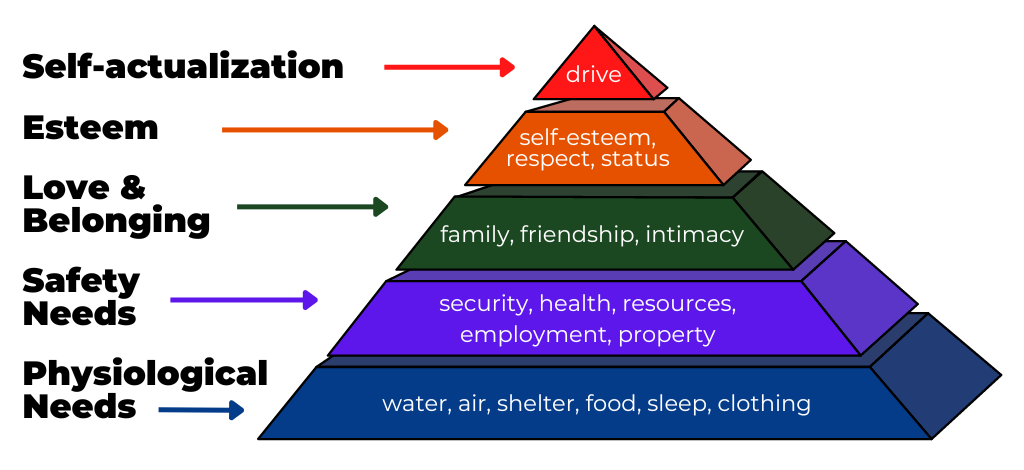To get started on the road to recovery from addiction, it is important to learn about your own needs and how to meet them. In this guide, we’ll talk about the different emotional, physical, and social needs that are necessary for a balanced and healthy life. Understanding and meeting your needs are crucial steps toward a successful and long-lasting recovery. By taking care of these needs and being aware of them, you can better prepare for the challenges that come with recovery.
What Are the Basic Needs of a Person?
As humans, we all have basic needs that are essential for our survival and well-being. These needs include physiological needs like food, water, and shelter, as well as safety needs such as protection from harm. Additionally, we have psychological needs like love, belonging, and self-esteem.
To better understand these needs and how they relate to one another, we can turn to Maslow’s Hierarchy of Needs. Keep reading to learn more about Maslow’s Hierarchy of Needs and how it provides a framework for understanding the basic needs of a person.
What is Maslow’s Hierarchy of Needs?
Maslow’s Hierarchy of Needs is a psychological theory proposed by Abraham Maslow in 1943. It suggests that humans have five levels of needs that must be met in a certain order, starting with the most basic needs like food and water, and ending with the need for self-actualization. The levels in this pyramid of needs are:
- Physiological needs: These include basic requirements for survival, such as food, water, warmth, and rest.
- Safety needs: The need for security and safety, both physically and emotionally.
- Love and belonging needs: The need for relationships, friendships, and a sense of belonging.
- Esteem needs: The desire for recognition, respect, and self-esteem.
- Self-actualization needs: The need to realize one’s full potential, creativity, and personal growth.

How Do You Recognize Your Needs?
Recognizing your needs is the first step toward meeting them. Here are some tips to help you identify your needs:
- Self-reflection: Spend time reflecting on your feelings, thoughts, and experiences. Try to understand what is missing or what you desire in your life.
- Journaling: Write down your thoughts, feelings, and experiences daily. This can help you identify patterns and recognize your needs over time.
- Listen to your body: Pay attention to physical sensations and emotions. They can often signal unmet needs.
- Seek feedback: Talk to friends, family, or a therapist about your experiences and emotions. They can provide valuable insights into your needs.
How Do You Meet Your Needs?
The first step in meeting your needs is recognizing them. Once you’ve recognized your needs, the next step is to find ways to meet them. While taking action and doing things that satisfy your needs can be difficult, it is always possible. Let’s dive deeper into understanding each kind of human need, to then take a look at a few strategies for meeting your emotional, physical, and social needs.
What Are Emotional Needs?
Emotional needs are the psychological aspects that are essential to our well-being, such as feeling loved, supported, and valued. Some common emotional needs include:
- Affection: The need for warmth, tenderness, and physical touch to feel emotionally connected to others. Affection can be expressed through hugging, holding hands, or gentle touches, and it helps to build and maintain strong emotional bonds with loved ones.
- Validation: The need to feel recognized, acknowledged, and understood by others. Validation involves having one’s feelings, thoughts, and experiences affirmed and accepted, which contributes to a sense of self-worth and emotional well-being.
- Security: The need for emotional stability, predictability, and a sense of safety in relationships. Security comes from knowing that one’s emotional needs will be met consistently and that one’s feelings and well-being are a priority for their loved ones.
- Empathy: The need to feel understood and cared for by others. Empathy involves the ability to put oneself in another person’s shoes, to genuinely understand their emotions and perspectives, and to respond with compassion and support.
- Respect: The need to be treated with dignity, consideration, and appreciation by others. Respect involves valuing and honoring another person’s feelings, opinions, and individuality, and it plays a vital role in fostering healthy, balanced relationships.
Meeting Your Emotional Needs
Here are some ways to meet your emotional needs:
- Practice self-care: Engage in activities that make you feel good, such as exercise, meditation, or pursuing hobbies. Prioritizing your physical well-being can help you feel more nourished and taken care of emotionally.
- Establish boundaries: Set healthy limits with others to protect your emotional well-being. Healthy boundaries can look like saying “no” to participating in things that don’t align with your interests or values, and generally following your intuition about what is right and wrong.
- Seek therapy: A therapist can help you explore your emotions, uncover issues that might be bothering you, and develop strategies to meet your emotional needs.
- Build a support system: Surround yourself with people who care about you and can provide emotional support.
For more in-depth tips on how to meet your emotional needs, we recommend checking out the Emotional Wellness Toolkit made by the National Institutes of Health (NIH). These resources provide valuable insights on mindfulness and coping with loss which can help you build emotional resilience and well-being.
What Are Physical Needs?
Physical needs are the basic requirements for maintaining your body’s health and well-being. Some common physical needs include:
- Adequate nutrition: The need to consume a balanced diet, providing all the necessary nutrients, vitamins, and minerals required for the body to function properly and maintain overall health. Adequate nutrition involves consuming a variety of foods, staying hydrated, and ensuring that the body receives the necessary energy for daily activities.
- Regular exercise: The need to engage in physical activity to maintain and improve physical fitness, cardiovascular health, and overall well-being. Regular exercise can include various activities such as walking, jogging, swimming, strength training, or participating in sports. This helps to prevent a range of health issues while promoting mental health and emotional balance.
- Sufficient sleep: The need to obtain an adequate amount of restorative sleep each night to allow the body and mind to recover, repair, and rejuvenate. Sufficient sleep is crucial for maintaining physical health, cognitive function, emotional well-being, and overall quality of life.
- Hygiene and personal care: The need to maintain cleanliness and practice personal care routines to protect the body from infection and illness, and promote a sense of well-being. Hygiene and personal care involve regular bathing, oral care, grooming, and maintaining a clean living environment to support overall health and prevent disease.
Meeting Your Physical Needs
Here are some ways to meet your physical needs:
- Develop a balanced diet: Consume a variety of fruits, vegetables, proteins, and whole grains to ensure you get all the necessary nutrients to keep your body healthy and happy. It can be helpful to create a food journal where you write down each meal of every day, to then look over it at the end of the week and determine if your meals have been healthy and balanced.
- Establish a regular exercise routine: Aim for at least 150 minutes of moderate-intensity aerobic activity or 75 minutes of vigorous aerobic activity per week, along with strength training exercises. If you can’t find the time or energy to stick to the recommended amounts of exercise, try to go for long walks or engage in any activity that gets your body moving for at least 30 minutes a day.
- Make sleep a priority: Aim for 7-9 hours of sleep every night and stick to a consistent sleep schedule. To help you get a night of good sleep, try avoiding screens before bedtime so that your mind can relax and your eyes can signal to your brain that it’s nighttime.
- Maintain personal hygiene: Shower regularly, brush your teeth, and engage in other self-care practices to promote physical well-being.
When establishing which basic psychological needs are satisfied by physical activity, studies found that people who participate in organized activities feel a higher sense of competence. On the other hand, people who participate in unstructured activities feel a higher level of autonomy.
While most people understand the importance of a workout routine, fewer people grasp the impact of day-to-day movement. Participating in routine exercise regimens and unstructured activities that get your blood pumping both have immense value to those in recovery and people in general.
What Are Social Needs?
Social needs are the desires for connection, belonging, and interaction with others. Some common social needs include:
- Companionship: The need to form and maintain meaningful relationships with others. Companionship provides a sense of belonging and helps individuals feel connected to their social environment. This can include friendships, family bonds, romantic relationships, or connections with peers and colleagues.
- Support: The need to receive and provide assistance, encouragement, and care to others. Support can come in many forms, such as emotional, informational, or practical help, and is essential for overcoming challenges and maintaining emotional well-being.
- Communication: The need to engage in verbal and nonverbal exchanges with others, sharing thoughts, feelings, and experiences. Effective communication allows individuals to express themselves, understand others, and build strong relationships. This can include conversation, active listening, and the use of body language to convey meaning.
- Acceptance: The need to feel understood, valued, and respected by others, regardless of individual differences or personal choices. Acceptance involves fostering an environment where people can be their authentic selves without fear of judgment or rejection, promoting self-esteem and a sense of belonging.
- Recognition: The need to be acknowledged and appreciated for one’s achievements, contributions, and personal qualities. Recognition can come in various forms, such as praise, rewards, or public acknowledgment, and helps to validate an individual’s sense of self-worth and accomplishment.
Meeting Your Social Needs
Here are some ways to meet your social needs:
- Foster relationships: Invest time and energy in building and maintaining meaningful relationships with friends and family.
- Join social groups: Participate in clubs, organizations, or support groups where you can meet like-minded individuals.
- Engage in community activities: Volunteer, attend local events, or join community classes to connect with others.
- Develop better communication skills: Practice active listening and assertive communication to improve your interactions with others.
- Seek professional help if needed: A therapist or counselor can help you address social anxiety, develop social skills, and improve your relationships.
Why Is It Important to Know Your Needs?
Recognizing and meeting your emotional, physical, and social needs is a crucial step in lasting recovery from addiction. When we don’t meet our needs, we may turn to drugs or alcohol to fill the void. By understanding your needs, you can make informed decisions about your life, set healthy boundaries, and prioritize self-care. Meeting your needs also helps you cultivate better communication in your relationships and contributes to a happier, more satisfying life. Ultimately, taking care of your needs not only leads to personal growth and self-awareness but also supports lasting recovery.
What Happens When Your Needs Aren’t Met?
When your needs go unmet, it can lead to negative consequences for your emotional and physical health, as well as your relationships. This is especially true for those recovering from addiction, as unmet needs can contribute to substance use as a way of coping with the distress caused by those needs not being met. You may experience emotions like anxiety, depression, or a sense of emptiness. Your physical health may also suffer, leading to chronic fatigue, weight changes, or a weakened immune system. Addressing your needs is crucial for lasting recovery and a happier, healthier life.
Can One Person Meet All Your Needs?
It’s unrealistic and unhealthy to expect one person to meet all your needs. Relying on a single individual for emotional, physical, and social support can strain the relationship and leave both parties feeling overwhelmed. It’s essential to develop a diverse support network, practice self-reliance, and communicate your needs to maintain balanced, fulfilling relationships.
Learn How to Meet Your Needs in Treatment
At Royal Life Centers, we understand that recognizing and meeting your needs is essential to achieving lasting recovery from addiction. That’s why we offer a variety of specialized treatment programs tailored to meet your unique needs. Our addiction specialists and support staff are committed to providing you with the guidance, accountability, and support you need every step of the way. We offer evidence-based therapies such as cognitive behavioral therapy (CBT) and Dialectical Behavioral Therapy (DBT), as well as relapse prevention groups, aftercare planning services, and ongoing addiction treatment services to help you maintain your sobriety.
If you or someone you know is struggling with addiction, remember that you don’t have to go through it alone. Seeking help is a sign of strength, and our team at Royal Life Centers is here to support you every step of the way. We offer a variety of evidence-based therapies and support services to help you meet your emotional, physical, and social needs in a safe and welcoming environment. Contact us directly by calling 877-RECOVERY or learn more about our addiction treatment programs and how we can help you achieve lasting recovery.











